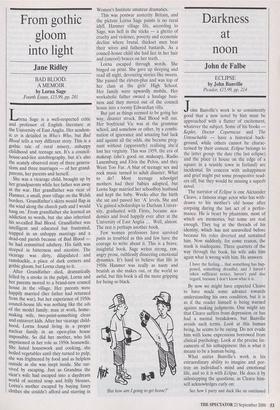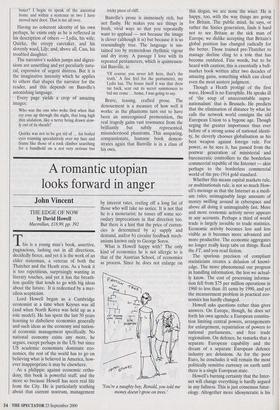Darkness at noon
John de Falbe
ECLIPSE by John Banville Picador, £15.99, pp. 214 John Banville's work is so consistently good that a new novel by him must be approached with a flutter of excitement, whatever the subject. Some of his books — Kepler, Doctor Copernicus and The Untouchable — have a historical back- ground, while others cannot be charac- terised by their context. Eclipse belongs to the latter group: the date (the last eclipse) and the place (a house on the edge of a square in a seaside town in Ireland) are incidental. Its concern with unhappiness and grief might put some prospective read- ers off, but they would be missing a superb novel.
The narrator of Eclipse is one Alexander Cleave, a famous stage actor who has with- drawn to his mother's old house after corpsing during the last act of a perfor- mance. He is beset by phantoms, most of which are memories, but some are real enough. They tug at the threads of his identity, which has not unravelled before because his roles diverted and sustained him. Now suddenly, for some reason, the mask is inadequate. Three quarters of the way through the book, his wife asks him again what is wrong with him. He answers: I have the feeling... that something has hap- pened, something dreadful, and I haven't taken sufficient notice, haven't paid duc regard, because I don't know what it is.
By now we might have expected Cleave to have made some advance towards understanding his own condition, but it is as if the reader himself is being warned against making judgments. One might say that Cleave suffers from depression, or has had a mental breakdown, but Banville avoids such terms. Look at this human being, he seems to be saying. Do not evade him with loose expressions borrowed from clinical psychology. Look at the precise lin- eaments of his unhappiness: this is what it means to be a human being.
What unites Banville's work is his extraordinary ability to imagine and por- tray an individual's mind and emotional life, and so it is with Eclipse. He does it by sidestepping the questions, as Cleave him- self acknowledges early on: See how I parry and duck like an outclassed
boxer? I begin to speak of the ancestral home and within a sentence or two I have moved next door. That is me all over.
Having no coherent identity of his own perhaps, he exists only as he is reflected in his description of others — Lydia, his wife; Quirke, the creepy caretaker, and his slovenly ward, Lily; and, above all, Cass, his troubled daughter.
The narrative's sudden jumps and digres- sions are unsettling and yet peculiarly natu- ral, expressive of urgent distress. But it is the imaginative intensity which he applies to others that shapes the narrator for the reader, and this depends on Banville's astonishing language.
Every page yields a crop of amazing images:
Who was the one who woke first when that cry rose up through the night, that long high thin ululation, like a nerve being drawn slow- ly out of its sheath?
Quirke was not to be got rid of ... his boiled eyes roaming speculatively over my face and frame like those of a rock climber searching for a handhold on a not very serious but
tricky piece of cliff.
Banville's prose is immensely rich, but not flashy. He makes you see things in fresh, vivid ways so that you repeatedly want to applaud — not because the image is clever (although it is) but because it is so resoundingly true. The language is sus- tained too by tremendous rhythmic vigour and dry irony. A passage I love with its repeated pentameters, which is quintessen- tial Banville, is:
'Of course; you never left here, that's the truth.' A fine feel for the pentameter, my Lydia has. The house itself it was that drew me back, sent out its secret summoners to bid me come ... home, I was going to say.
Brave, teasing, crafted prose. The denouement is a measure of how well it works: as the phantoms turn out to have been an unrecognised premonition, the real tragedy gains vast resonance from the brilliantly but subtly represented, misunderstood phantoms. This unsparing, compassionate, humane book demon- strates again that Banville is in a class of his own.























































































 Previous page
Previous page